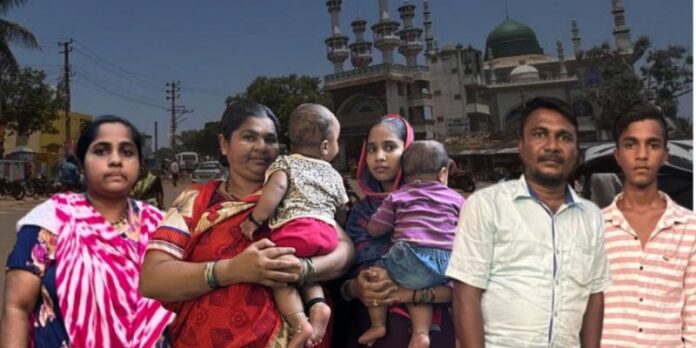Hubli, Karnataka(London Post)–After the Hubli riots, Muslim families in Karnataka’s Hubli are seeking justice for their arrested sons, who have been detained for over a year. The incident, which started with a controversial social media post, quickly turned violent and was later classified as an “act of terrorism”. Families allege bias and demand fair treatment for their loved ones.
Nazmeen Jamadar vividly remembers the day her life took a painful turn. With her husband, Shamsuddin, sitting at the front door of their Hubli home, the couple awaited news from a nearby pathology lab about Nazmin’s first-trimester pregnancy. Little did they know that their joy would soon be overshadowed by police intervention.
Shamsuddin, who was suddenly detained for questioning, was later arrested in connection with a case of rioting outside the Old Hubli police station on 16 April 2022. He was implicated in four of the 12 First Information Reports (FIRs). Police, all related to the same alleged crime. These FIRs mention the involvement of 100-150 unknown persons in the riots.
The incident came to light during the holy month of Ramadan when many Muslim residents gathered to offer prayers at the Badi Masjid near the police station. Tensions flared after a Hindu youth, Abhishek Hare Math, posted a highly objectionable picture on WhatsApp, sparking outrage in the Muslim community. A group of angry youths then stormed the police station demanding Hermuth’s arrest.
The situation quickly turned from a riot case to an “act of terrorism” as the police invoked the Unlawful Activities (Prevention) Act (UAPA) against the accused. The case was later transferred to a designated National Investigation Agency (NIA) court in Bengaluru, about 450 km from Hubli.
For Nazmin, the ordeal of her husband’s arrest and subsequent detention has been particularly troubling. She gave birth to her twin sons prematurely in October last year, but Shamsuddin has yet to meet them. Despite efforts to bring the infant to Gulbarga Central Jail, where her husband is lodged along with other co-accused, she has been denied visitation.
Nazmin’s family is not alone in their grief. The Muslim-majority neighborhoods of Hubli, including Anand Nagar, Ajmer Nagar, Asar Mahal, Bintakta, Mantoor Road, and Old Hubli area, have witnessed several arrests in connection with the riots. Families that have lost their sole breadwinners, especially young people in their late teens and early twenties, are now struggling to make ends meet.
The legal battle has been difficult for the families, with bail being denied and a lack of evidence adding to their frustrations. Activists, lawyers and concerned people have held rallies in support of the detainees, highlighting the need for a fair investigation and justice. Efforts are on in the Supreme Court to seek relief for those arrested as well as to challenge multiple FIRs registered for the same incident.
Despite the pleas of the family, the police has remained silent on pending investigations and the reasons for not applying UAPA charges in some FIRs. Critics argue that the case has been mishandled, taking a simple incident of rioting and turning it into a complex case of terrorism based on limited evidence such as CCTV footage and mobile tower data has been given.
Families determined to fight against the power of the state hope that justice will be served. With no faith in the legal system, they look to the Supreme Court for relief and the possibility of reuniting with their loved ones. As the case gains more attention, it has the potential to shed light on issues of bias, maladministration, and strict enforcement of laws, leading to significant changes in the legal landscape.






